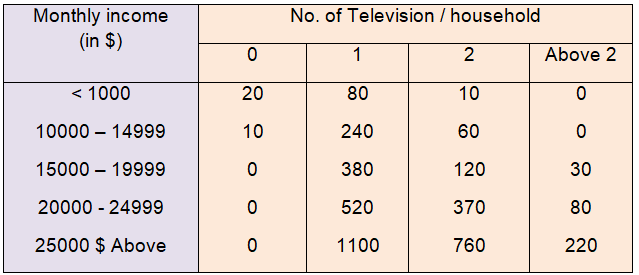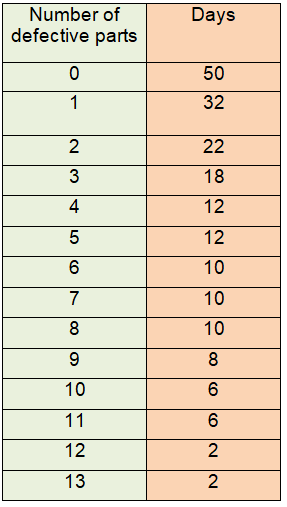SOLVING WORD PROBLEMS ON PROBABILITY
Problem 1 :
The record of a weather station shows that out of the past 150 consecutive days, its weather forecasts were correct 110 times.
i) What is the probability that it was correct on a given day ?
ii) What is the probability that it was not correct on a given day ?
Solution :
Records taken for 150 consecutive days = 150
Its weather forecasts were correct 110 times.
i) The forecast was correct on a given day
= 110/150
Ii) The forecast was not correct on a given day
= 150 – 110
= 40
= 40/150
= 4/15
Problem 2 :
The percentage of marks obtained by a student in the monthly unit tests are given below :

Based on this data, find the probability that the students gets more than 75% marks in a unit test.
Solution :
Total number of unit test = 6
Percentage of marks obtained in more than 75 is 3.
= 3/6
= 1/2
Problem 3 :
A company selected 4000 households at random and surveyed them to find out a relationship between income level and the number of television sets in a home. The information so obtained is listed in the following table :

i) Of a household earning $10000 – $14999 per year and having exactly one television.
ii) Of a household earning $25000 more per year and owning two television.
iii) Of a household not having any television.
Solution :
The total number of the households = 4000
i) Number of household earning $10000 – $14999 per year and having exactly one television = 240
Required probability = 240/4000
= 3/50
ii) Number of household earning $25000 more per year and owning two television = 760
Required probability = 760/4000
iii) Number of a household not having any television = 30
Required probability = 30/4000
= 3/400
Problem 4 :
Two dice are thrown simultaneously 500 times. Each time the sum of the two numbers appearing on their tops is noted and recorded as given in the following table :

If the dice are thrown once more, what is the probability of getting the sum :
i) 3 ?
ii) More than 10 ?
iii) Less than or equal to 5 ?
iv) Between 8 and 12 ?
Solution :
Total trials = 500
i)
= 3/500
Probability of getting the sum as 3 = 30/500
= 3/50
ii) To find the sum more than 10 :
= (28 + 15)
= 43
= 43/500
iii)To find the sum less than or equal to 5 :
= (14 + 30 + 42 + 55)
= 141
Probability = 141/500
iv) To find between 8 and 12 :
= (53 + 46 + 28)
= 127
Probability = 127/500
Problem 5 :
Over the past 200 working days, the number of defective parts produced by a machine is given in the following table :

Determine the probability that tomorrow’s output will have :
i) No defective part.
ii) At least one defective part.
iii) Not more than 5 defective parts.
iv) More than 13 defective parts.
Solution :
Total days = 200
i) No defective part = 50
Probability of no defective parts = 50/200
= 1/4
ii) At least one defective part = 200 – 50
= 150
The probability that tomorrow’s output will have = 150/200
= 3/4
iii) Not more than 5 defective parts
= 50 + 32 + 22 + 18 + 12
= 146
The probability that tomorrow’s output will have = 146/200
= 73/100
iv) More than 13 defective parts = 0
Problem 6 :
A school management committee interviewed some people for the post of principle. The committee wanted that the female candidate should also be given the fair chance. So, they called the male & female candidates 2 : 3 ratio.
i) What is the probability that female candidate being selected ?
Solution :
The male & female candidates 2 : 3 ratio.
i) The probability that female candidate being selected
= 3/(2 + 3)
= 3/5
Problem 7 :
100 cards marked from 2 to 101 are placed in a box & mixed thoroughly. One card is drawn at random from the box. Find the probability that number on the card is :
i) An even number.
ii) A number, which is a perfect square ?
iii) A prime number less than 20.
Solution :
Total cards = 100
Sample space n(s) = 100
i) Even number = {2, 4, 6, 8, 10, 12, 14, 16, 18, 20, 22, 24, 26, 28, 30, 32, 34, 36, 38, 40, 42, 44, 46, 48, 50, 52, 54, 56, 58, 60, 62, 64, 68, 70, 72, 74, 76, 78, 80, 82, 84, 86, 88, 90, 92, 94, 96, 98, 100}
Total even number = 50
The probability that number on the even number card is : 50/100
= 1/2
ii) Perfect square = (4, 9, 16, 25, 36, 49, 64, 81, 100)
= 9/100
iii) Prime number less than 20 is :
= (2, 4, 6, 8, 10, 12, 14, 16, 18, 20)
= 10/100
= 2/25
Problem 8 :
A survey was conducted in a group of students as a part of their environment awareness program in which they collected the following data regarding the number of plants planted in 30 hours in a locality

i) Find the probability of the number of hours having 12 – 15 plants.
ii) Find the probability of number of hours having less than 6 plants.
Solution :
Total hours = 30
i) The probability of the number of
hours having 12 – 15 plants = Number of hours/total hours
= 8/30
= 4/15
ii) The probability of number of hours = 9/30
having less than 6 plants
= 3/10
Recent Articles
-
Finding Range of Values Inequality Problems
May 21, 24 08:51 PM
Finding Range of Values Inequality Problems -
Solving Two Step Inequality Word Problems
May 21, 24 08:51 AM
Solving Two Step Inequality Word Problems -
Exponential Function Context and Data Modeling
May 20, 24 10:45 PM
Exponential Function Context and Data Modeling